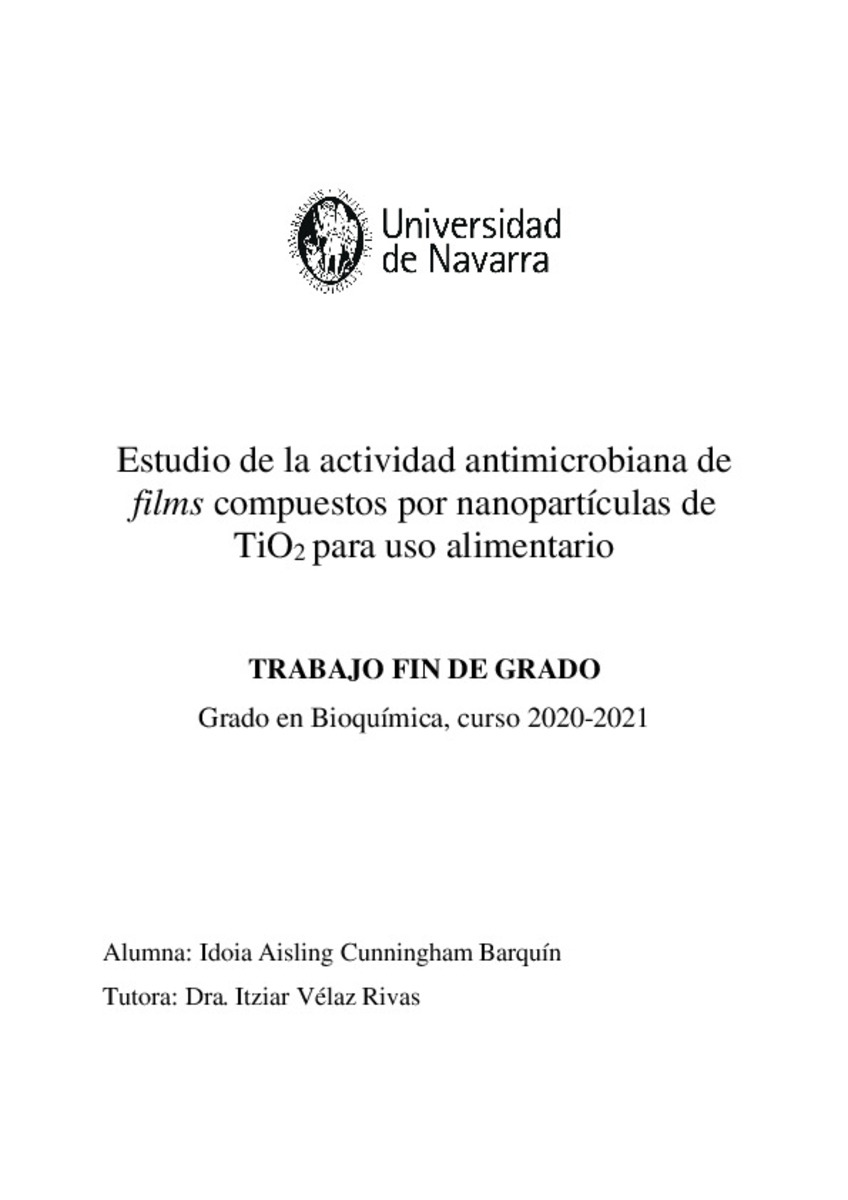Full metadata record
| DC Field | Value | Language |
|---|---|---|
| dc.contributor.advisor | Vélaz-Rivas, I. (Icíar) | - |
| dc.creator | Cunningham-Barquín, I.A. (Idoia Aisling) | - |
| dc.date.accessioned | 2021-06-04T07:58:39Z | - |
| dc.date.available | 2021-06-04T07:58:39Z | - |
| dc.date.issued | 2021 | - |
| dc.date.submitted | 2021 | - |
| dc.identifier.uri | https://hdl.handle.net/10171/60674 | - |
| dc.description.abstract | Actualmente, hay un gran interés en la industria alimentaria por dotar los films con los que se envasa la comida, de características que mejoren los servicios suministrados por los films convencionales. El objetivo es aumentar la estabilidad de los alimentos y reducir su pérdida. Una de las estrategias empleadas es el uso de la nanotecnología en la creación de envases activos, equipando a la matriz polimérica de nanopartículas que tienen actividad antimicrobiana, con el propósito de aumentar la calidad y seguridad del alimento que protegen. Las nanopartículas de TiO2 (NP) destacan entre las nanopartículas por su poder fotocatalítico con el que ejerce su actividad antimicrobiana. Este trabajo consiste en la derivatización de estas nanopartículas con β-ciclodextrina (βCD) y la inclusión del conservante alimentario ácido sórbico (SA) en su cavidad, para ser implementadas en una matriz polimérica hidrosoluble. En este caso se ha empleado el alcohol polivinílico (PVA) como matriz polimérica, con el propósito de crear films con una superficie activa y estudiar su actividad antimicrobiana en la bacteria Gram negativa Escherichia coli y en la bacteria Gram positiva Staphylococcus aureus. Tras este estudio, se concluye que los films que contienen nanopartículas de TiO2 tienen mayor actividad antimicrobiana que aquellos que no las contienen. Por el análisis estadístico se concluye que la presencia de ácido sórbico no parece suponer una mejora significativa. No obstante, en los ensayos en disolución se observa que el ácido sórbico libre tiene un gran poder antimicrobiano, probablemente, en el caso de los films el conservante queda atrapado en la matriz polimérica y por eso su acción antimicrobiana queda mermada. | es_ES |
| dc.description.abstract | Nowadays, the food processing industry has a great interest in supplying food-packaging films with properties that provide better services than those provided by conventional films. The aim is to increase food stability and to reduce its waste. One of the main strategies applied is the use of nanotechnology in the creation of active packages, equipping the polymer matrix of nanoparticles that possess antimicrobial activity, with the purpose of increasing the quality and safety of the food they protect. Of all the nanoparticles, the nanoparticles of TiO2 (NP) standout due to their photocatalytic activity with which they exert their antimicrobial activity. This research project entails the derivatization of these nanoparticles with β-cyclodextrin (βCD) and the inclusion of food preservative, sorbic acid (SA), in its cavity, for its implementation in a hydrosoluble polymer matrix. In this case, polyvinyl alcohol (PVA) has been utilized as the polymer matrix, with the goal of creating films with an active surface and to study their antimicrobial activity in the Gram-negative bacteria Escherichia coli and in the Gram-positive bacteria Staphylococcus aureus. Followed this project, it is concluded that the films containing nanoparticles of TiO2 have a greater antimicrobial activity than those without nanoparticles. With the statistical analysis it is concluded that the presence of sorbic acid does not seem to significantly increase the antimicrobial activity. However, in the experiments in solution it was observed that the free sorbic acid has a prominent antimicrobial activity, probably, in the case of the films the preservative is trapped in the polymer matrix, depleting its antimicrobial activity. | es_ES |
| dc.language.iso | spa | es_ES |
| dc.rights | info:eu-repo/semantics/openAccess | es_ES |
| dc.subject | Materias Investigacion::Ciencias de la vida::Bioquímica | es_ES |
| dc.subject | Nanopartículas de TiO2 | es_ES |
| dc.subject | Beta-ciclodextrina | es_ES |
| dc.subject | Ácido sórbico | es_ES |
| dc.subject | Films | es_ES |
| dc.subject | Alcohol polivinílico | es_ES |
| dc.subject | Actividad antimicrobiana | es_ES |
| dc.subject | E. coli | es_ES |
| dc.subject | S. aureus | es_ES |
| dc.subject | Nanoparticles of TiO2 | es_ES |
| dc.subject | Beta-cyclodextrin | es_ES |
| dc.subject | Sorbic acid | es_ES |
| dc.subject | Polyvinyl alcohol | es_ES |
| dc.subject | Antimicrobial activity | es_ES |
| dc.title | Estudio de la actividad antimicrobiana de films compuestos por nanopartículas de TiO2 para uso alimentario | es_ES |
| dc.type | info:eu-repo/semantics/bachelorThesis | es_ES |
Files in This Item:
Statistics and impact
Items in Dadun are protected by copyright, with all rights reserved, unless otherwise indicated.






